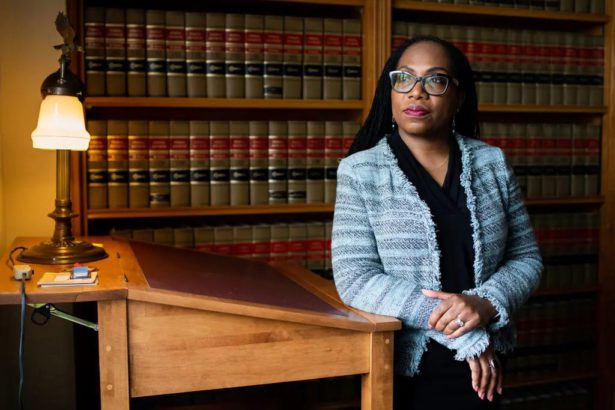An extraordinary constellation of pro-Israel influences have pervaded Ketanji Brown Jackson’s life and in some cases assisted her career… As a Supreme Court Justice, will she be able to live up to her pledge to interpret the law ‘without fear or favor’ ?
In the past, Supreme Court rulings influenced by Israel partisans have had significant impacts, including one that destroyed a 200-year American tradition….
By Alison Weir
As Supreme Court nominee Ketanji Brown Jackson went through the grueling, sometimes glaringly partisan hearings that comprise the Congressional approval process, one significant issue seems to have been ignored: Israel/Palestine. There has been one significant exception: the Democratic Majority for Israel, an AIPAC-connected PAC that advocates for pro-Israel policies, issued a public statement endorsing her.
In its flattering statement, DMFI emphasized her commitment to “equal justice under the law.” DMFI’s head Mark Mellman even went out of his way to publish an additional endorsement of Jackson in The Hill, announcing: “diversity means better outcomes.”
DMFI’s choice of these phrases is ironic, given that Israel was specifically founded to be a nation based on a system of un-equality, a system in which one ethno-religious group is placed above all others.
Numerous respected groups have stated that the Israeli system constitutes apartheid. From its founding war of ethnic cleansing through today, the Israeli system discriminates against Palestinian Muslims and Christians, and consistently perpetrates violent human rights abuses against men, women, and children, as documented by numerous groups.
DMFI was founded to cover up this reality and to promote pro-Israel policies, including obtaining billions of Americans’ tax dollars for Israel. Its political endorsements are specifically predicated on individuals’ support for Israel, who then dance to DMFI’s tune.
Why did DMFI publicly and enthusiastically endorse Jackson’s nomination?
Perhaps because they’re aware of the extraordinary constellation of pro-Israel law firms, judges, school friends, and cherished mentors that have surrounded Jackson – frequently assisting her career – and expect it to influence her rulings concerning Israel.
If this is the case, it may not be the first time the Supreme Court has been swayed by pro-Israel sentiments.
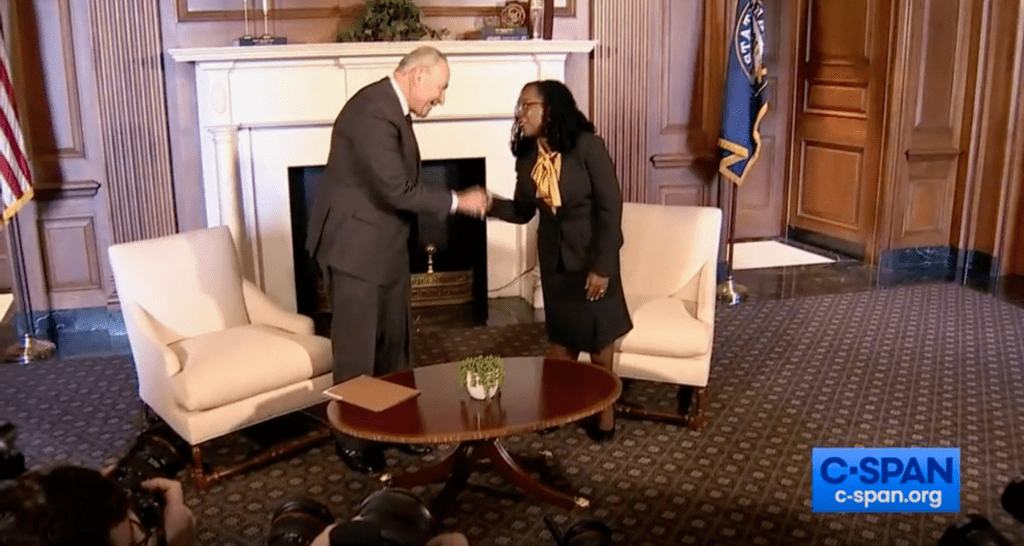
Supreme Court rulings re Israel
The Supreme Court has handed down some significant decisions over the years related to Israel.
One of these was in 1967, when an Israeli citizen brought a case before the Supreme Court that ended up changing a longstanding American tradition.
A naturalized American named Beys Afroyim, who had then become an Israeli citizen, sought to overturn a law that prohibited dual citizenship. Afroyim, whose original name had been Ephraim Bernstein, was a member of the communist party who had fled the U.S., lived in Cuba for awhile, and then moved to Israel.
While a previous lawsuit on behalf of a Mexican individual had failed, the Israeli lawsuit had a different fate. Although both the Washington DC District Court and the Court of Appeals had affirmed the U.S. law, the Supreme Court overturned their decisions and found in favor of the Israeli.
The swing vote was cast by Supreme Court Justice Abe Fortas, an Israel loyalist. The Jewish Press reports that Fortas “was an unabashed Israel supporter who influenced LBJ’s strong pro-Israel position during the 1967 Arab-Israeli War; as author/historian Laura Kalman aptly put it, he was ‘a Jew who cared more about Israel than Judaism.’”
Author Donald Neff writes: “Among his first thoughts when he was unseated from the court had been to visit Israel. There was nothing wrong with that, obviously, but it did indicate an attachment of such personal importance that he should have recused himself from the dual citizenship case.”
Neff concludes: “His action, along with four others on the court, had destroyed a 200-year tradition.” This occurred without the concurrence of the American people.
Fortas was eventually forced to resign over allegations that he had accepted a bribe from his friend corporate raider Louis Wolfson to protect Wolfson from going to prison for stock manipulation. Wolfson was reportedly “a staunch benefactor of Jewish causes and of the state of Israel.” Wolfson also allegedly bribed radio host Larry King during the episode.
(Fortas, like Jackson recently, was also charged with being soft on pornography – in his case for apparently documented reasons. Newsweek reports that the porn charge was “based in fact. Fortas was involved in several rulings that effectively legalized pornography.”)

AIPAC calls Supreme Court decision authored by Breyer a “victory”
Another court case regarding Israel was in 1998 and concerned the notorious pro-Israel lobby organization AIPAC (American Israel Public Affairs Committee). AIPAC has long been considered the most powerful organization for a foreign country in the U.S.
In 1996 a federal court had found that AIPAC and 27 pro-Israel political action committees were guilty of violating federal election laws.
The individuals who had initiated the case were ebullient, believing that the ruling could help loosen the “stranglehold” that Israel’s lobby had on U.S. Middle East policy. Largely because of AIPAC and the other members of the Israel lobby, the U.S. gives Israel over $10 million per day (and expends an additional $10 million per day on behalf of Israel).
The plaintiffs’ excitement at the court’s ruling was short lived, however. Eventually, the Supreme Court heard the case and rendered a decision that AIPAC declared a “victory.” The Jewish Telegraphic Agency reported that the Court’s ruling “made it highly unlikely that the pro-Israel lobby would have to disclose information about its membership and expenditures.”
An attorney for AIPAC said the Supreme Court “did exactly what we asked.”
Stephen Breyer
The decision was authored by Justice Stephen Breyer. One of the plaintiffs in the suit, former Illinois Congressman Paul Findley, wrote: “Breyer’s decision is one of those extremely rare cases in which the high court deliberately and blatantly finessed a showdown with one of the nation’s most powerful lobbies.”
Breyer, a distinguished, widely respected Justice who has mentored Jackson, may have committed an indiscretion. Despite an attachment to Israel that suggests recusal would have been appropriate, Breyer chose to remain on the case.
Breyer serves on the International Advisory Council of an Israeli organization called the Israel Democracy Institute (IDI). IDI is committed to Israel as a “Jewish state” and is “dedicated to strengthening the foundations of Israeli democracy.” It has received Israel’s most prestigious award, the Israel Prize for Lifetime Achievement.
Some of Breyer’s fellow Council members are neocon Elliott Abrams, New York Times columnist Bret Stephens, author Anne Applebaum, and former ambassador to Israel Martin Indyk.


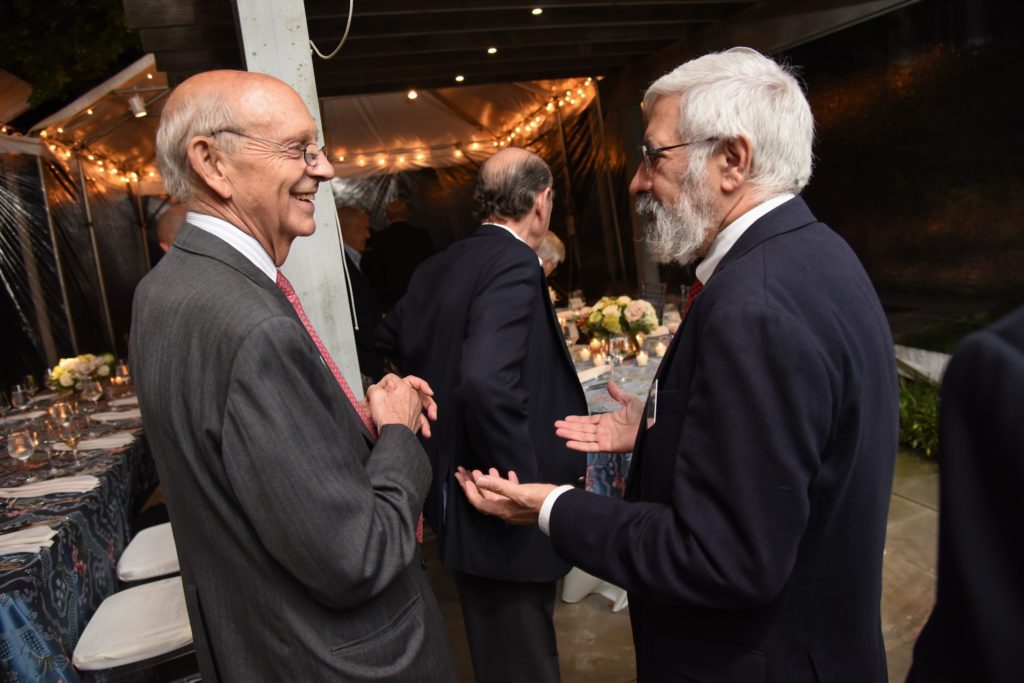
In addition to his service with IDI, Breyer has said that the U.S. should learn from Israeli courts.
This is a surprising viewpoint from a Justice known as a progressive. In point of fact, Israeli courts have long been known for their rampant abuses against Palestinians.
At the time that Breyer made this statement, the Israeli supreme court had just upheld the practice of detaining Palestinians without trial, sometimes for many years. It had also approved demolition of the family homes of Palestinian prisoners (this is collective punishment and illegal under the Geneva Conventions).

Israeli trials of Palestinians are often seen as kangaroo courts. At the time that Breyer praised Israel’s judicial system, the conviction rate of Palestinians in Israeli military courts was 97 percent (this has since grown to 99.74 percent).
A year before Breyer’s statement, Foreign Service Journal had published a detailed report on Israeli torture of Palestinian Americans, noting that Palestinian prisoners “are routinely denied family visits for long periods and deprived of access to legal counsel. Their interrogations routinely include torture.” Palestinians are often found “guilty” based on “confessions” in Hebrew, even when they don’t speak Hebrew.
Breyer’s seat on the court was known as the “Jewish seat” on the court (although two other Justices serving concurrently with him were also Jewish). The first holder of the seat had been Louis Brandeis, who had led World Zionism from his Supreme Court chambers. Ketanji Brown Jackson will now take Breyer’s seat.
Another Justice who voted on the case was also an open Israel partisan. Ruth Bader Ginsburg was a life long member of the Women’s Zionist Organization of America, received a lifetime award from Israel, and was an “enthusiastic” Zionist. Yet, she also did not recuse herself from the AIPAC case.
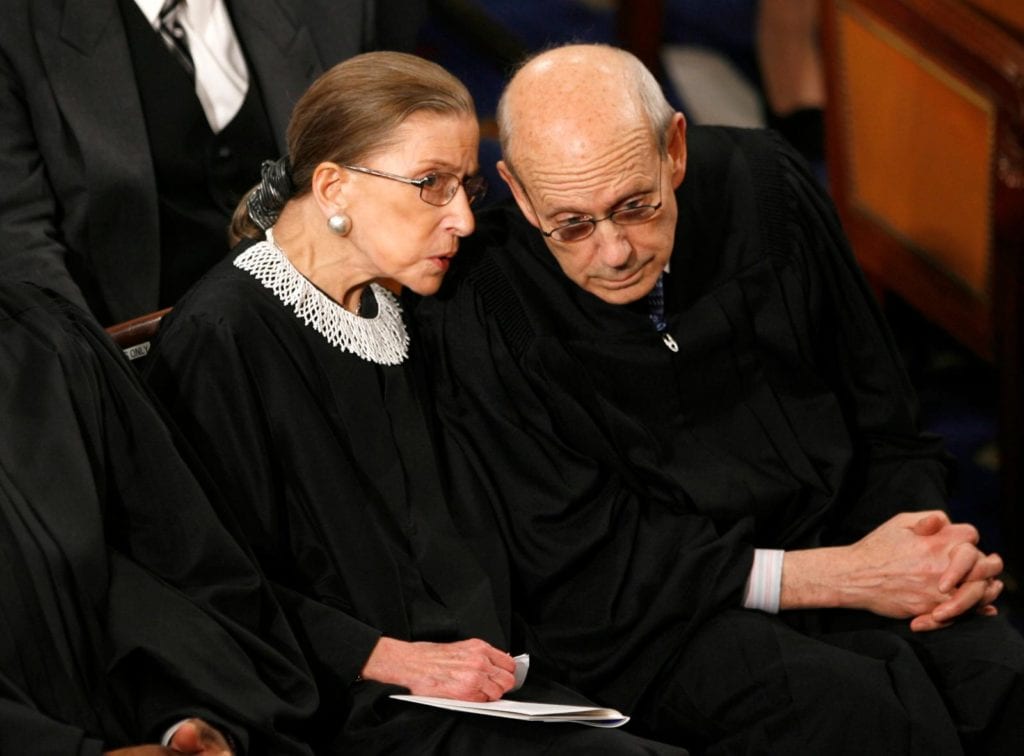
Future potential cases involving Israel
A new case connected to Israel has recently been submitted to the Supreme Court. This involves “Jewish Witnesses for Peace and Friends,” a small human rights group that has been holding a pro-Palestinian vigil outside a synagogue in Ann Arbor, Michigan, every week for 16 years.
The group’s founder is a retired electrical engineer named Henry Herskovitz, who had been a member of the synagogue. After visiting the Occupied Palestinian Territories in 2002, Herskovitz asked to speak to the congregation about the Israeli oppression of Palestinians that he had witnessed (numerous groups have documented Israel’s systemic human rights violations).
When Herskovitz was prohibited from speaking to the congregation, and the synagogue continued to support Israel (bringing in Israeli soldiers to speak and taking children on propaganda trips to Israel), he began a quiet, nonviolent vigil outside.
A synagogue member eventually sued Henry’s group, seeking an injunction to stop the protesters. He also asked punitive and compensatory damages for the “emotional distress” he says the vigils had caused him.
The suit failed, however, when both the U.S. District Court and the Sixth Circuit U.S. Court of Appeals ruled that the vigils were protected under the First Amendment.
However, the case has been submitted to the Supreme Court, where prominent Israel advocate Nathan Lewin hopes to overturn the lower courts’ ruling.
If anyone can bring another Supreme Court ruling favorable to Israel, it’s Lewin.
Lewin is an extremely heavy hitter. He has reportedly argued hundreds of cases in his 60-year law career, 28 of them before the U.S. Supreme Court. Chabad reports that Lewin was named by the DC Legal Times as one of “Washington’s Greatest Lawyers of the Past 30 Years” and was ranked Number 2 of “Washington’s Best Lawyers” by the Washingtonian.
Hadassah Magazine reports: “Nathan is known as a passionate advocate of Jewish causes.” About 75 percent of his firm’s cases concern Jewish matters, a number concerning Israel. In one case he successfully destroyed an American nonprofit that had provided medical supplies, wheel-chairs, and backpacks filled with school supplies to Palestinians. In another case he defended two AIPAC officials charged with giving classified information to Israel.
According to Washington Jewish Week, “Lewin incorporates Jewish content on the advice of a man he was ‘proud to consider a friend,’ he said: Menachem Elon, a former justice of the Supreme Court of Israel and head of the Jewish Law Institute of the Hebrew University of Jerusalem.”
Chabad reports that Lewin had “a long and warm relationship” with Justice Ruth Bader Ginsburg. “In fact, Ginsburg’s office called Lewin shortly after she joined the Supreme Court for his guidance in affixing a mezuzah to her chambers.” Chabad, one of Lewin’s clients, was dedicated to The Rebbe, whose teachings included supremacist views.
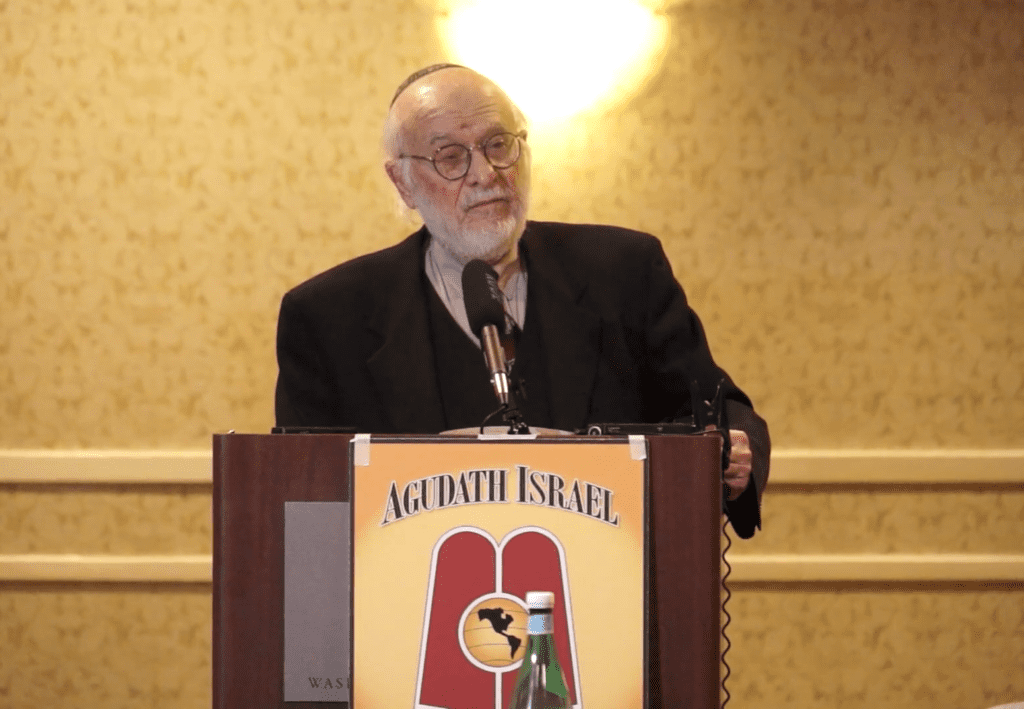
Lewin & other Israel partisans helped give Jackson her start
Jewish Insider credits Lewin with giving Ketanji Brown Jackson “her start.” Her first law firm employment was with Lewin’s previous firm and earlier she had been a summer intern. (Justices Amy Coney Barrett and Brett Kavanaugh also worked at the firm early in their careers.)
Preceding her employment with Lewin, Jackson had clerkships with two judges, both of whom she has praised as mentors, and both of whom were also Israel partisans.
The first was with Patti Saris, who was affiliated with the American Jewish Committee (which advocates for Israel), who’s an active member of a synagogue that announces its commitment to “the Jewish people in Israel,” and whose husband is a Patron and Trustee of Israel’s Yad Hanadiv, a Rothschild family foundation.
The second was with Bruce M. Selya, a longtime friend of Ruth Bader Ginsburg. Selya has served as chairman of the Rhode Island ADL, Director of the Jewish Federation of Rhode Island, and Director of the Jewish Community Relations Council, all of which advocate for Israel; he and his wife are donors to the Jewish Alliance of Greater Rhode Island, which supports Israel. This was an important clerkship and some consider it pivotal in Jackson’s path to the Supreme Court. Jackson calls Selya one of the “key mentors” in her life.

Following her employment at Lewin’s firm, Jackson obtained an even greater plum: a Supreme Court clerkship. This was for Justice Breyer, whose seat she will take take. Jackson calls Breyer a “great mentor” and says he gave her “the greatest job that any young lawyer could ever hope to have.”
Jackson was next employed at Goodwin Proctor LLP. Goodwin, like many large, prestigious firms, has a section devoted to Israel. Its website says: “We have a long-standing commitment to the Israel business community and have sponsored numerous conferences and seminars.” It announces: “We understand the Israeli legal structure, culture and business environment, and many lawyers in our practice are proficient in Hebrew.”
Jackson next went to the Feinberg Group, LLP (which later became Feinberg Rozen), a Washington DC law firm whose founder, Kenneth Feinberg, is fervently pro Israel. Feinberg opposes Jewish assimilation because, he says, it poses “a fundamental problem in distancing Jews from the state of Israel.”
(Feinberg is an extremely powerful attorney who has administered the massive payouts for a number of programs, including the 9-11 victims fund, where he decided how much each family of a 9/11 victim would receive. Some victims said he was extremely unfair in his determinations.)
Jackson was next employed at Morrison & Foerster LLP, whose website affirms its “historic commitment to Israel.” It announces: “For more than four decades, Morrison & Foerster has been at the forefront of the Israeli market, representing numerous Israeli companies globally, at every stage of their evolution, as well as the foreign investors and investment banks that finance those companies.”
The firm states that Jackson “grew into an experienced Supreme Court practitioner through the firm’s hefty book of corporate work and pro bono opportunities.” She was recruited as part of a “plan to create one of the most diverse Supreme Court practices in the country.”
Georgetown Day School
Jackson has extolled the elite private school (tuition ~$45,000) that her daughter attends and on whose board she serves. Jackson points out that it was the first school to be integrated in Washington D.C. and specifically noted the important role of Jewish families in founding it. She failed to mention (or didn’t know) that the founder, an educator named Agnes O’Neil, was the daughter of a Presbyterian pastor.

The school has a number of Israel connections, including gap year options that include three different trips to Israel, and parent commencement speakers and board members that feature extremely prominent Israel partisans.
One was Martin Indyk, former ambassador to Israel who had previously worked for AIPAC and its spinoff, Washington Institute for Near East Policy. (Indyk is also a fellow member with Breyer of IDI’s advisory council.)
Another parent commencement speaker, president of the school’s board of trustees, and 12-year board member, is another powerful Israel partisan: Susie Gelman.
Gelman, descendant of the Strauss and Lazard families and the daughter of two billionaires, is a major Israel advocate.
She was the inaugural chair and an ongoing board member of the Birthright Israel Foundation (which takes Jewish youths on propaganda trips to Israel), served three terms as president of the Jewish Federation of Greater Washington (which advocates for Israel), is chairwoman of the Israel Policy Forum, and is a member of the Board of Governors of Israel’s Hebrew University. Husband Michael Gelman was the inaugural chairman of the board of The Israel Project, currently serves on its executive committee, and is on the boards of the Jewish Agency for Israel, Hillel, and AIPAC spin-off Washington Institute for Near East Policy.
Jewish and Israeli media portrayed Jackson’s comments about Georgetown Day School as referring to an alleged “Black-Jewish” alliance.
There is evidence that such apparent partnerships are more complicated, and that at times they may have been created and used by Israel partisans. Zionist leader Rabbi Stephen Wise was a founding member of the NAACP, and Zionists remained active in it for many years. More recently, the Democratic Majority for Israel ran a campaign ad for Georgia politicians Rafael Warnock and Jon Ossoff, portraying them as partners; both position themselves as “pro-Israel.”

Left out of the ad is the fact that Ossoff, who made his first trip to Israel as a teen, got his start by helping knock out a Black pro-Palestinian Congress member.

Jackson’s oft mentioned Miami high school
Jackson often notes that her high school and the school’s debate coach have been major influences in her life. The New York Times reports: “Judge Jackson has spoken often, including in her 2013 swearing-in as a judge, about how much high school meant to her.”
The Times notes that “the school held outsize importance in her life, thanks to a competitive speech and debate team led by a famed coach who molded her protégés into sharp-tongued speakers and quick critical thinkers.”
Jackson herself states: “That was an experience that I can say without hesitation was the one activity that best prepared me for future success in law and in life.” The debate coach, Fran Berger, is credited with playing a role in Jackson’s attendance at Harvard. A member of the debate team says: “We all did end up in Ivy League schools.”
The Times reports that “Jackson grew up in what she has described as a predominantly Jewish suburb of Miami, attending her friends’ bar and bat mitzvahs.” The article reports that the “tightknit” team members “remain unusually close 30 years later.”
With one possible exception, all Jackson’s debate teammates mentioned in the Times‘ article have connections to Israel:
Amy Berger Chafetz, daughter of the coach, is active with a number of pro-Israel organizations, including AIPAC.

Jackson teammate Nathaniel Persily was a featured speaker at the Zionism 3.0 Conference. Laura Anne Stuzin is a member of the Jewish Federation of Miami, which is “committed to Israel,” and of Temple Beth Shalom Miami, whose website states: “Israel is a cornerstone that connects every one of our members.” Jackson’s prom date, Benjamin G. Greenberg, studied in Israel after college. Stephen F. Rosenthal is an active leader of a synagogue that partnered with AIPAC on an event celebrating trips to Israel for over 40 members of Congress, noting:, “There is nothing quite like visiting Israel and seeing it up close and in-person. These trips have a profound impact on members of Congress, demonstrating the importance of a strong U.S.-Israel relationship.”

In recent years, many of the school’s students continue to have Israel connections, some traveling to Israel and volunteering for the Israeli military.

All indications suggest that Jackson grew up in a milieu in which pro-Israel sentiment was pervasive and unquestioned, while the situation for Palestinians who had been dispossessed by Israel was rarely, if ever, part of the picture. While many Jewish Americans such as the American Council for Judaism have long opposed Israel’s racialist system and injustice, there is no indication of such a viewpoint among these Jackson friends.
Z Street case
Several years ago Jackson ruled in the DC appeals court in favor of an organization called “Z Street,” a particularly hardcore, hawkish pro-Israel organization attempting to obtain an IRS tax exemption.
While her ruling greatly pleased Z Street and could appear to suggest a pro-Israel bias, it can also be understood as a commitment to the legal requisites involved in the case.
As the Times of Israel reports: “Jackson accepted Z Street’s argument that the group was not suing to avoid taxes but because it alleged the government was subjecting it to “viewpoint discrimination,” which would be unconstitutional under speech freedom protections.” The U.S. Court of Appeals then approved her decision.
On the other hand, the IRS had argued that Z Street’s lawsuit was barred by the Anti-Injunction Act, which prohibits suits to “restrain the assessment or collection of any tax.” Politico reports that an IRS official had explained that the agency needed “to ensure that the organization will put procedures in place to prevent resources from being used to support terrorism.” Diverse investigations have found dozens of American-based organizations that support settlement groups that perpetrate violent attacks.
In a recent commentary, Nathan Lewin writes that Jackson’s ruling on the case provides “grounds for optimism” on how she will rule on matters related to Israel and America’s Jews.
He also reveals that while employed at his firm, Jackson had drafted a Supreme Court petition on behalf of the school board of Kiryas Joel, a town created when Hasidic Jews reportedly “bought up land in a rural area, populated it exclusively with members of their faction and then created a village comprised of members of their religion and governed by their theocratic tradition.”
What does the future hold?
It’s impossible to know at this time whether, or to what degree, the pervasive network outlined above of pro-Israel mentors, clerkships, employment, schools, assistance, and general milieu will unconsciously condition Jackson’s decisions. At least one upcoming case will be presented by the attorney who gave Jackson “her start.”
In addition to that potential case, there are others concerning Israel that could come before the Supreme Court. For example, numerous important lawsuits on the issue have been filed by a nonprofit organization, Institute for Research. Among them:
- IRmep sues IRS for documents on charitable flows to Israeli settlements
- IRmep sues NARA for Secret Clinton and Bush Nuclear Pledges to Israel
- IRmep challenges the secret “Israel Nuclear Weapons Gag Order” WNP-136
- IRmep sues to release the names of employees at the U.S. Treasury’s secretive OTFI Unit
- Challenging the secret gag order that guts transparency and the Arms Export Control Act to deliver unlawful U.S. foreign aid to Israel
- IRmep sues for CIA files on the illegal diversion of US weapons-grade uranium from NUMEC to Israel
- In court battle IRmep wins release of 1987 Pentagon report detailing aspects of Israel’s nuclear weapons production facilities and work on hydrogen bombs.
- IRmep sues IRS for documents on charitable flows to Israeli settlements
- IRmep sues for CIA files on the illegal diversion of US weapons-grade uranium from NUMEC to Israel
If any of these or similar cases eventually arrive at the Supreme Court, the court’s decision – and Jackson’s vote – could be extremely significant for the United States.
The U.S. government’s decades-long support for Israel has caused massive tragedy, carnage, world-wide instability, and profound harm of many varieties to our own country.

This support has been obtained by a special interest lobby on behalf of a foreign government that has exorbitant influence in our media, academia, government, and political processes. It has pushed us into disastrous wars, threatens to do this again, and played a role in others. A Supreme Court free of such influence is crucial for our future.
There is considerable evidence that Jackson is highly intelligent, extremely hardworking, and desires to live a moral, principled life and to adjudicate fairly. At a time when our nation is grievously divided, American against American, the country desperately needs Justices that will transcend the prejudices that beset all sides. Jackson has achieved much in her life; perhaps she will achieve this.
In her moving opening statement, Jackson declared: “I love our country and the Constitution, and the rights that make us free.”
She pledged that she would “defend the Constitution and the grand experiment of American democracy that has endured over these past 246 years” and promised to judge all cases “without fear or favor, consistent with my judicial oath.”
Let us hope that she – and the other Justices – live up to those words.
Alison Weir is executive director of If Americans Knew, president of the Council for the National Interest, and author of Against Our Better Judgment: The Hidden History of How the U.S. Was Used to Create Israel. One of her talks can be viewed here.
Our operations are funded solely by generous individuals like you. Your contribution will help us continue shining a light on the Israel/Palestine situation and the U.S. connection.
DONATERELATED:
- Democratic bigwigs create group DMFI to promote Israel to progressives
- Israel surpasses 1,000 demolitions in occupied West Bank since Biden took office
- The role of the Israel lobby in Jon Ossoff’s ascendance
- Boycotting Russia is compulsory, while boycotting Israel is punished
- Let Us Rethink Our ‘Special Relationship’ with Israel
- WATCH: The 78 Palestinian children Israel killed in 2021, & the one Israeli child killed by Palestinians
- WATCH: If Americans Knew: Essential facts on Israel-Palestine & the U.S.

